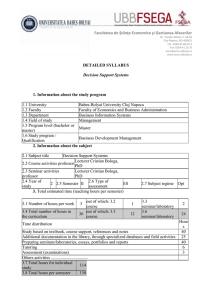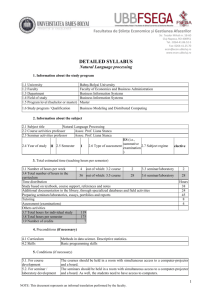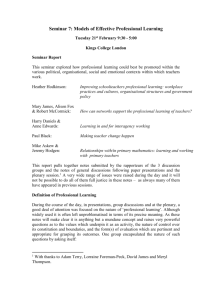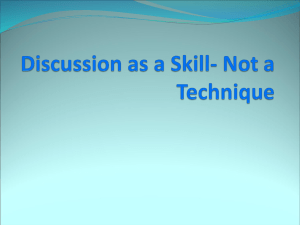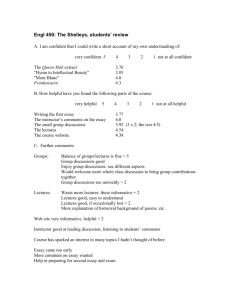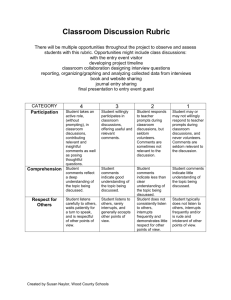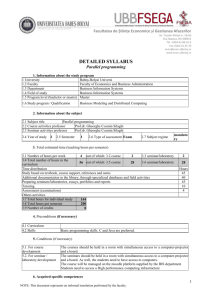Facultatea de Ştiinţe Economice şi Gestiunea Afacerilor Str. Teodor
advertisement
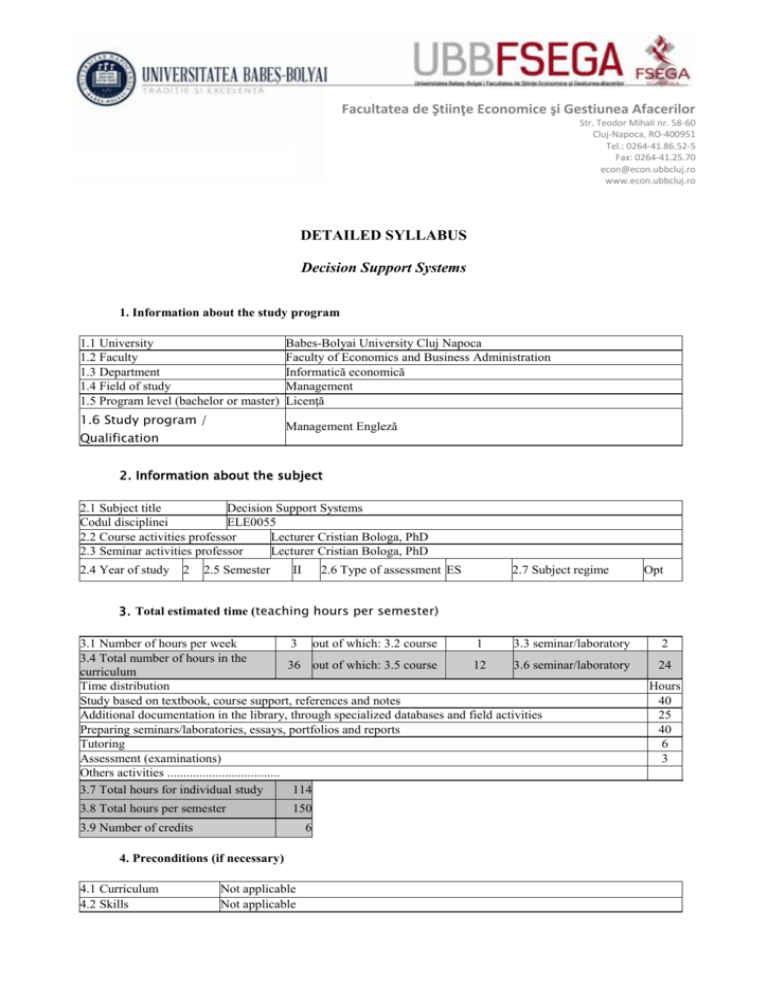
Facultatea de Ştiinţe Economice şi Gestiunea Afacerilor Str. Teodor Mihali nr. 58-60 Cluj-Napoca, RO-400951 Tel.: 0264-41.86.52-5 Fax: 0264-41.25.70 econ@econ.ubbcluj.ro www.econ.ubbcluj.ro Ă DETAILED SYLLABUS Decision Support Systems 1. Information about the study program 1.1 University 1.2 Faculty 1.3 Department 1.4 Field of study 1.5 Program level (bachelor or master) 1.6 Study program / Babes-Bolyai University Cluj Napoca Faculty of Economics and Business Administration Informatică economică Management Licenţă Management Engleză Qualification 2. Information about the subject 2.1 Subject title Decision Support Systems Codul disciplinei ELE0055 2.2 Course activities professor Lecturer Cristian Bologa, PhD 2.3 Seminar activities professor Lecturer Cristian Bologa, PhD 2.4 Year of study 2 2.5 Semester II 2.6 Type of assessment ES 2.7 Subject regime Opt 3. Total estimated time (teaching hours per semester) 3.1 Number of hours per week 3 out of which: 3.2 course 1 3.3 seminar/laboratory 3.4 Total number of hours in the 36 out of which: 3.5 course 12 3.6 seminar/laboratory curriculum Time distribution Study based on textbook, course support, references and notes Additional documentation in the library, through specialized databases and field activities Preparing seminars/laboratories, essays, portfolios and reports Tutoring Assessment (examinations) Others activities ................................... 3.7 Total hours for individual study 114 3.8 Total hours per semester 150 3.9 Number of credits 6 4. Preconditions (if necessary) 4.1 Curriculum 4.2 Skills Not applicable Not applicable 2 24 Hours 40 25 40 6 3 5. Conditions (if necessary) 5.1. For course development 5.2. For seminar / laboratory development For course lectures there are necessary: video-projector, whiteboard, Internet access For laboratories there are necessary: computer network, Internet access, video-projector, whiteboard 6. Acquired specific competences Professional competences • • • Transversal competences • • Participation in the development and implementation of software applications for financial accounting Assist management in decision making Preparation of financial statements of the summaries, the reports made for various organizations and analyzes, summaries, forecasts and economic assessment Knowledge, explanation and interpretation of ideas, processes, phenomena, status and trends for specific economic activities and development of value judgments grounded at micro and macro level Use technology and modern tools for information processing and management of databases for specific economic and social activities 7. Subject objectives (arising from the acquired specific competences) 7.1 Subject’s general objective Understanding of the key technologies used in the management of information and organizations. 7.2 Specific objectives Knowledge of: • types of existing information systems that serve the decision-making process: accounting information systems, finance, human resources, sales and marketing, manufacturing and services • decision support systems • executive information systems • office automation systems • intelligent information Systems • e-commerce systems •integrated business management systems; customer relationship management systems; supply chain management systems 8. Contents Teaching methods Introduction, data, information, knowledge, information society, decisions, types Lecture of decisions, the decision-making process Information system, features, components, role of information systems in Lecture business Types of information systems, decision support systems, characteristics, Lecture structure, stages of development of a decision support system, benefits Intelligent systems, features; expert systems Lecture E-business Systems, advantages, disadvantages, risks; Lecture Models and categories of e-business, e-commerce categories; legislation on electronic commerce Integrated business management systems; customer relationship management Lecture systems; supply chain management systems Data warehouse; On line analytical processing of data; Data mining; Business Lecture Intelligence Manifestation of risks in information systems Lecture 8.1 Course Observations One lecture One lecture Two lectures One lecture Two lectures Two lectures Two lectures One lecture References: 1. Vicki L. Sauter -Decision Support Systems for Business Intelligence, Wiley, 2011 2. Simha R. Magal - Integrated Business Processes with ERP Systems, Wiley, 2011 3. France Belanger - Information Systems for Business: An Experiential Approach, Wiley, 2011 4. Marakes G.M., Decision Support Systems in the 21st Century, Second Edition, Prentice Hall, 2002. 5. James O'Brien, George Marakas - Management Information Systems, McGraw-Hill/Irwin Teaching 8.2 Seminar/laboratory Observations methods Practical aspects regarding the components of a computer system Discussions, One laboratory individual study Business Information Systems; examples Discussions, Two individual study laboratories Decision support systems; examples Discussions, Two individual study laboratories Intelligent systems, expert systems, examples Discussions, One laboratory individual study Ecommerce systems-examples Discussions, Two individual study laboratories Integrated business management-examples Discussions, One laboratory individual study Customer relationship management systems and vendors-examples Discussions, One laboratory individual study Data warehouses, multidimensional data analysis systems-examples Discussions, One laboratory individual study Data mining, business intelligence -examples Discussions, One laboratory individual study References: 1. Vicki L. Sauter -Decision Support Systems for Business Intelligence, Wiley, 2011 2. Simha R. Magal - Integrated Business Processes with ERP Systems, Wiley, 2011 3. France Belanger - Information Systems for Business: An Experiential Approach, Wiley, 2011 4. Marakes G.M., Decision Support Systems in the 21st Century, Second Edition, Prentice Hall, 2002. 5. James O'Brien, George Marakas - Management Information Systems, McGraw-Hill/Irwin, 2010 9. Corroboration / validation of the subject’s content in relation to the expectations coming from representatives of the epistemic community, of the professional associations and of the representative employers in the program’s field. Expectations of business area regarding economics graduates conduct to the idea of knowledge of management and information technology used in business management. The role of this discipline is to familiarize students with the new technologies that are beginning to be implemented increasingly in Romanian companies and organizations. 10. Assessment (examination) Type of activity 10.1 Assessment criteria 10.4 Course Knowledge about the concepts and technologies presented in the course 10.3 Weight in the final grade Quizzes throughout the semester 10% 10.2 Assessment methods Written exam with open questions. 10.5 The students has to develop an individual Seminar/laboratory project based on laboratory activity Theory minimum mark: 5 Project Laboratory minimum mark: 5 40% 50% 10.6 Minimum performance standard • It is necessary to obtain a minimum grade of 5 (five) in order to pass this subject; • The grades being granted are between 1 (one) and 10 (ten); • Students must approach each element (question, problem) within the exam sheet; • The exam is written and takes approximately 50minutes; Date of filling Signature of the course professor Signature of the seminar professor 13.01.2015 Lect.dr. Bologa Cristian Lecturer Bologa Cristian,Phd Head of department’s signature: Prof.dr.habil. Gheorghe Cosmin Silaghi Date of approval by the department 28.01.2015
